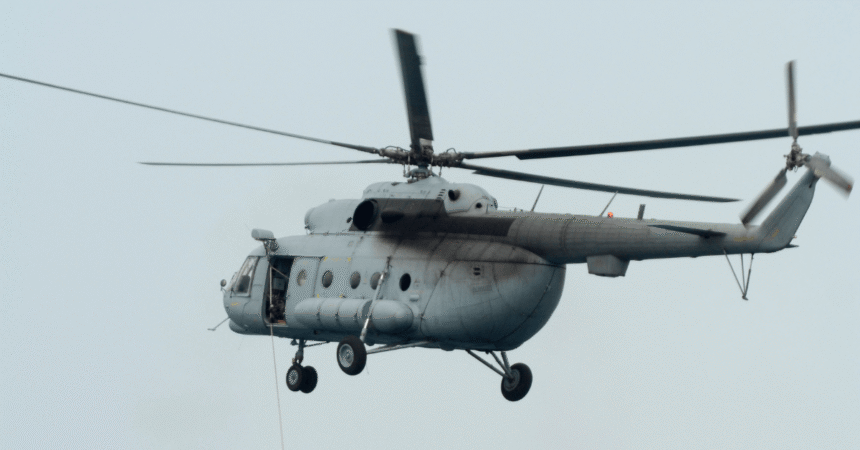A tragic incident unfolded in North Waziristan District on Saturday when a chartered helicopter belonging to Mari Petroleum Company Limited crashed shortly after take-off, resulting in the deaths of six individuals and injuries to another eight. The MI-8 helicopter, reportedly carrying three foreign nationals, including Russian pilots and crew, met its unfortunate fate near the Shiwa Oilfield, highlighting ongoing concerns regarding aviation safety in the region.
Details of the Incident
According to initial reports from local authorities and eyewitnesses, the helicopter experienced a technical fault shortly after departing. Sources indicated that engine failure was the primary cause of the crash, and there was no evidence suggesting any form of sabotage. The MI-8 helicopter was in the process of transporting personnel and equipment to the oil field when the situation deteriorated rapidly.
Eyewitness accounts reveal that shortly after take-off, the helicopter began to lose altitude. Despite the pilots’ efforts to stabilize the aircraft, it ultimately crashed in a nearby field. This incident has raised alarms over the maintenance and operational standards of chartered flights in the region, especially those used in the oil and gas sector, where helicopters are essential for transportation.
crossorigin=”anonymous”>Casualties and Emergency Response
The aftermath of the crash was chaotic, as emergency services quickly mobilized to the scene. Six people were pronounced dead at the site, while eight others sustained various degrees of injuries. The injured were swiftly transported to the Combined Military Hospital (CMH) Thal for urgent medical care. Authorities confirmed that arrangements were being made to transfer the injured to larger medical facilities using helicopters, ensuring they received the necessary treatment promptly.
Local emergency responders faced significant challenges in reaching the crash site due to its remote location. However, the rapid response of military personnel and local rescue teams played a crucial role in managing the situation. The injured victims were described as being in stable condition as of the latest updates, and efforts were underway to assess the extent of their injuries.
Investigation Initiated
In the wake of the crash, an inquiry has been launched to determine the precise cause of the accident. Investigators will scrutinize various factors, including the helicopter’s maintenance history, the technical capabilities of the crew, and any potential operational issues that may have contributed to the crash. Preliminary reports have pointed towards a technical failure, but a thorough investigation will be essential to uncover the full details.
The aviation industry in Pakistan has faced scrutiny in recent years, particularly following several high-profile accidents. The government has emphasized the need for stricter regulations and oversight in the aviation sector to enhance safety standards. This incident will likely reignite discussions around the safety protocols followed by chartered aviation companies, especially in challenging terrains like North Waziristan.
crossorigin=”anonymous”>Background of Mari Petroleum Company
Mari Petroleum Company Limited is one of Pakistan’s leading oil and gas exploration and production companies. Founded in 1954, the company has played a vital role in developing the country’s energy resources. With numerous exploration blocks, Mari Petroleum is actively involved in enhancing oil and gas production to meet national energy demands.
Given its significant operations in remote areas, the company relies heavily on helicopter services for transporting personnel and equipment to and from oilfields. While helicopters are often the only means of access in such regions, the associated risks underline the need for rigorous safety measures and regular maintenance checks.
The Aviation Landscape in Pakistan
The helicopter crash in North Waziristan sheds light on the broader challenges faced by the aviation industry in Pakistan. The country has a complex geography that often necessitates the use of helicopters for transportation, especially in rural and mountainous regions. However, the industry has been marred by incidents involving both commercial and private aircraft.
Recent years have seen an increase in aviation accidents, leading to calls for improved regulatory oversight. The Pakistan Civil Aviation Authority (PCAA) has been working on implementing stricter regulations to enhance safety standards in the aviation sector. However, the enforcement of these regulations has often been inconsistent, raising concerns among industry experts and the public alike.
crossorigin=”anonymous”>Previous Incidents and Safety Concerns
This incident is not isolated; Pakistan has experienced several aviation accidents over the years. In recent history, crashes involving both commercial and private aircraft have raised alarms over safety standards. The PCAA has faced criticism for its regulatory practices and the need for more stringent inspections and training protocols for pilots.
The helicopter industry, in particular, has faced scrutiny due to its operational challenges in Pakistan’s rugged terrain. Factors such as unpredictable weather conditions, technical malfunctions, and inadequate infrastructure can contribute to accidents. As a result, aviation safety remains a critical issue that demands immediate attention and action from the authorities.
Community Reactions
The crash has elicited strong reactions from local communities, especially in North Waziristan, where residents are already grappling with the challenges of living in a conflict-prone area. Many expressed their condolences to the families of the victims and called for a thorough investigation to prevent such tragedies from recurring in the future.
Local leaders and community organizations have emphasized the need for greater awareness and education about aviation safety. They argue that the government should invest in improving infrastructure and services in remote areas, ensuring that residents feel safe and secure in their transportation options.
crossorigin=”anonymous”>Moving Forward: Recommendations for Improvement
In light of the tragic helicopter crash, several recommendations can be made to enhance aviation safety in Pakistan:
- Stricter Regulations: The government and aviation authorities must implement stricter regulations regarding helicopter maintenance and operation. Regular inspections and compliance checks should be mandatory for all chartered aviation companies.
- Pilot Training: Enhanced training programs for pilots, particularly in handling emergencies, can help mitigate risks during flights. Simulation training should be integrated into pilot education to prepare them for various scenarios.
- Public Awareness: Raising public awareness about aviation safety can empower communities to advocate for better services and regulations. Information campaigns can educate residents on safe practices when using helicopter services.
- Infrastructure Development: Investing in infrastructure, such as helipads and maintenance facilities in remote areas, can improve operational efficiency and safety. This investment will not only benefit companies but also enhance the overall safety of air travel for local communities.
- Emergency Response Plans: Establishing comprehensive emergency response plans for aviation accidents can ensure that authorities are prepared to handle such situations swiftly and effectively. Coordination between military and civilian emergency services is essential for successful rescue operations.
Final Thoughts
The helicopter crash involving Mari Petroleum Company Limited serves as a stark reminder of the challenges facing the aviation industry in Pakistan. As the investigation unfolds, it is crucial for stakeholders to prioritize safety and implement changes that will prevent future tragedies. The lives lost in this tragic incident underscore the importance of vigilance, regulation, and accountability in ensuring the safety of all who rely on air travel in the region.
In the coming weeks, as investigations progress, it is hoped that lessons learned from this incident will lead to meaningful changes in the aviation sector, fostering a safer environment for both passengers and crew. The families of the victims deserve answers and assurance that measures will be taken to prevent such devastating events from occurring again.
#HelicopterCrash #NorthWaziristan #AviationSafety #MariPetroleum #PakistanNews #EmergencyResponse #TechnicalFailure







